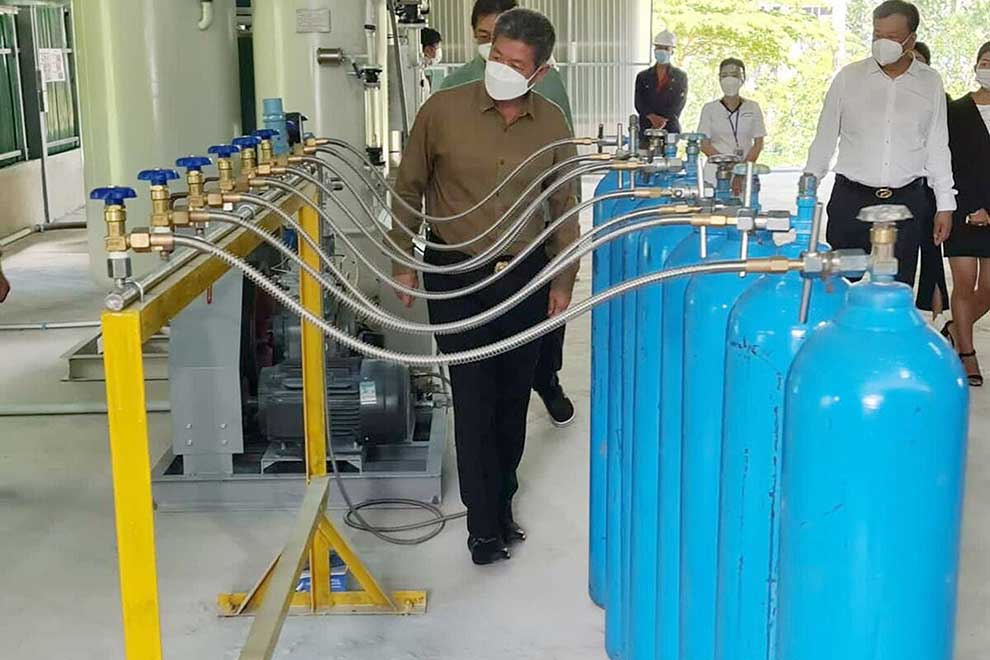
Preah Sihanouk provincial governor Kuoch Chamroeun visits the oxygen generation plant in his province last year. PREAH SIHANOUK ADMINISTRATION
Medical-grade oxygen is in high demand at all hospitals across the country. Most supplies are produced only in Phnom Penh, meaning that public and private hospitals in remote provinces have to spend time and money obtaining supplies.
Self-production of oxygen for local distribution is significant factor in improving patient outcomes, as it means a reduction in time and expense, and eliminates the risk of supplies running out, which can result in serious risk to patients.
The output of oxygen generators depends on the size and specifications of each individual machine, but the Ministry of Health intends to ensure that each province has its own oxygen plant.
The ministry said establishing oxygen plants in each province would dramatically reduce the expenditure of regional hospitals and clinics, many of whom currently purchase supplies from the private sector.
It added that it would make a significant contribution to timely responses, which would save lives.
“It will save time, money and reduce the risk of hypoxia, which is dangerous to the treatment of patients,” the ministry said.
Phnom Penh was one of the first bases to have the first oxygen machine to distribute and supply to public and private hospitals throughout the country. Battambang, Koh Kong and Banteay Meanchey provinces have also announced the success of their own oxygen production, with Preah Sihanouk recently joining them.
On September 20, the province inaugurated the Techo Covid-19 Treatment Building, Laboratory Centre and Oxygen Generator at Preah Sihanouk Referral Hospital.
Long Dimanche, deputy governor of Preah Sihanouk, told The Post that the province being able to produce its own oxygen was an excellent development, and showed the close attention the government – as well as provincial authorities – paid to the well-being of the people.
He said oxygen production is very important because it makes significant contribution to hospitals’ ability to guarantee successful patient outcomes.
“We can reduce costs because we no longer have to buy oxygen from Phnom Penh. We save time and money, and have a regular supply,” he added.
“In addition, we have eliminated the risks associated with any supply chain, such as long waiting times or the delays in delivery that sometimes occur when demand is high. Now that we have our own machines, when demand is high, we simply increase production,” he continued.
The oxygen generator at the referral hospital can produce about 60 cubic metres of oxygen per hour, equal to 10 tanks. According to Dimanche, on average, the hospital will run the machine for eight hours a day, giving a total output of 480 cubic metres.
Tov Meung, director of the Koh Kong Provincial Health Department, said that having an oxygen machine in the province had saved many patients’ lives, especially during the Covid-19 pandemic. Respiratory diseases such as the virus meant patients often required additional oxygen.
He added that in the past, when the oxygen ran out, they had to transport the empty tanks to Phnom Penh to be refilled.
“We now have the technology we need to produce our own oxygen,” he said.
Foroogh Foyouzat, UNICEF Representative to Cambodia, said that a reliable oxygen supply could be the difference between life and death. Due to the importance of oxygen, UNICEF has been working with the government to improve the supply of oxygen generation and its related infrastructure in the Kingdom, and trained staff in their use.
Ung Ratana, director of the Ratanakkiri provincial health department, told The Post in October that the province was preparing to install its own oxygen generators.
He said that the inability to produce oxygen on its own was a serious obstacle to providing treatment, as the province spent time and money securing supplies from Phnom Penh.
“Because we could not produce our own, we were ordering it. Fortunately, we were able to control the Covid-19 situation, and the health ministry was able to ensure we received the funding we needed to order it as we needed it,” he added.
Ratana said that some parts of the new system were ready, and he expected the oxygen production facility to come online very soon. It would then be capable of meeting the demands of the province.









